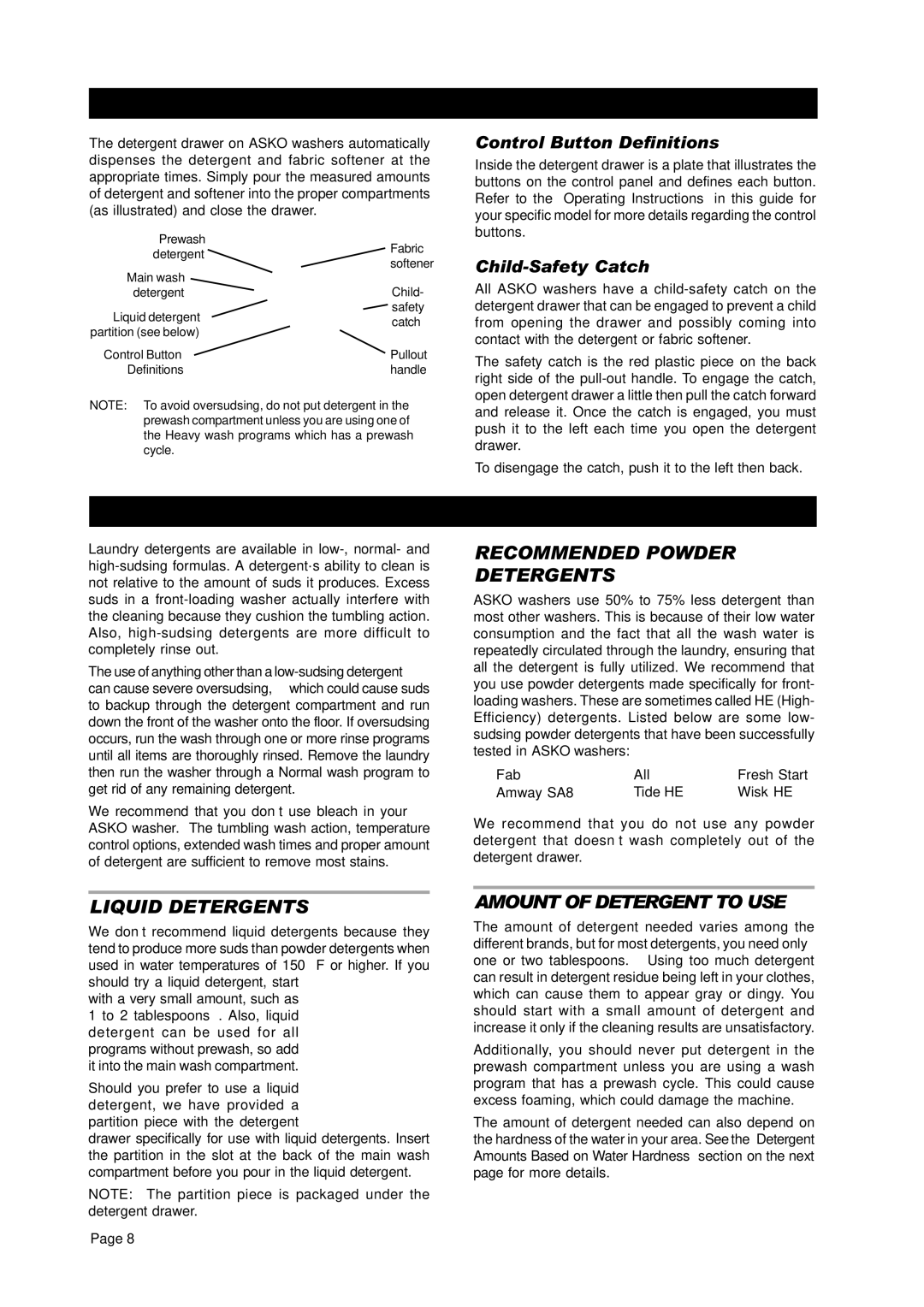
THE DETERGENT DRAWER
The detergent drawer on ASKO washers automatically dispenses the detergent and fabric softener at the appropriate times. Simply pour the measured amounts of detergent and softener into the proper compartments (as illustrated) and close the drawer.
Prewash
detergent | Fabric | |
softener | ||
Main wash | ||
Child- | ||
detergent | ||
Liquid detergent | safety | |
catch | ||
partition (see below) | ||
| ||
Control Button | Pullout | |
Definitions | handle |
NOTE: To avoid oversudsing, do not put detergent in the prewash compartment unless you are using one of the Heavy wash programs which has a prewash cycle.
Control Button Definitions
Inside the detergent drawer is a plate that illustrates the buttons on the control panel and defines each button. Refer to the “Operating Instructions” in this guide for your specific model for more details regarding the control buttons.
Child-Safety Catch
All ASKO washers have a
The safety catch is the red plastic piece on the back right side of the
To disengage the catch, push it to the left then back.
DETERGENTS
Laundry detergents are available in
The use of anything other than a
We recommend that you don’t use bleach in your ASKO washer. The tumbling wash action, temperature control options, extended wash times and proper amount of detergent are sufficient to remove most stains.
LIQUID DETERGENTS
We don’t recommend liquid detergents because they tend to produce more suds than powder detergents when used in water temperatures of 150° F or higher. If you should try a liquid detergent, start
with a very small amount, such as
1 to 2 tablespoons. Also, liquid detergent can be used for all programs without prewash, so add it into the main wash compartment.
Should you prefer to use a liquid detergent, we have provided a partition piece with the detergent
drawer specifically for use with liquid detergents. Insert the partition in the slot at the back of the main wash compartment before you pour in the liquid detergent.
NOTE: The partition piece is packaged under the detergent drawer.
Page 8
RECOMMENDED POWDER DETERGENTS
ASKO washers use 50% to 75% less detergent than most other washers. This is because of their low water consumption and the fact that all the wash water is repeatedly circulated through the laundry, ensuring that all the detergent is fully utilized. We recommend that you use powder detergents made specifically for front- loading washers. These are sometimes called HE (High- Efficiency) detergents. Listed below are some low- sudsing powder detergents that have been successfully tested in ASKO washers:
♦ | Fab | ♦ | All | ♦ | Fresh Start |
♦ | Amway SA8 | ♦ | Tide HE | ♦ | Wisk HE |
We recommend that you do not use any powder detergent that doesn’t wash completely out of the detergent drawer.
AMOUNT OF DETERGENT TO USE
The amount of detergent needed varies among the different brands, but for most detergents, you need only one or two tablespoons. Using too much detergent can result in detergent residue being left in your clothes, which can cause them to appear gray or dingy. You should start with a small amount of detergent and increase it only if the cleaning results are unsatisfactory.
Additionally, you should never put detergent in the prewash compartment unless you are using a wash program that has a prewash cycle. This could cause excess foaming, which could damage the machine.
The amount of detergent needed can also depend on the hardness of the water in your area. See the “Detergent Amounts Based on Water Hardness” section on the next page for more details.
